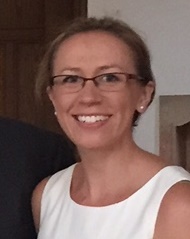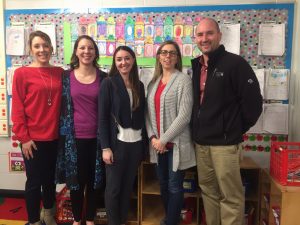 One of the best parts of being a teacher is that I’m always learning. Every year, I learn more about pedagogy, reading, and writing, so I know with one hundred percent certainty that I am not the same teacher I was when I started. I love the learning process and I wouldn’t change it for a thing, but every once in a while I can’t help but think that if I could travel back in time, I’d love to share some much-needed guidance with myself as a first-year teacher.
One of the best parts of being a teacher is that I’m always learning. Every year, I learn more about pedagogy, reading, and writing, so I know with one hundred percent certainty that I am not the same teacher I was when I started. I love the learning process and I wouldn’t change it for a thing, but every once in a while I can’t help but think that if I could travel back in time, I’d love to share some much-needed guidance with myself as a first-year teacher.
1. Don’t Take Home So Much Grading
I’m surprised that that first year (and for many years afterward, actually), I didn’t drown in a sea of grading. I would usually grade the quick stuff first, and then I’d tackle the dreaded essays. And, oh, those essays. I would carefully read each one, correcting grammar and mechanics, and commenting on word choice, style, and content. Then, when I finally passed them back, I’d be so frustrated that my students barely looked at what I’d written. I tried different protocols for having students review their feedback and set goals, but ultimately it didn’t make much difference. So, the argument I’d make to myself back then: you should stop.
Now, stay with me here. I’m not advocating being lazy or leaving students’ work without feedback. Quite the opposite, actually. The students wouldn’t read my comments and feedback because it was too late. They’d already felt like they had finished the project and moved on to the next unit. All of that precious feedback just seemed like criticism. Now, I still give my students all of that good feedback, but I try to do more of it before they ever turn the final draft in.
This has been a huge shift in my mindset and my instructional planning. In the past, I would teach a series of lessons, which the students would practice through carefully crafted assignments (most of which I’d created). Once I felt they were ready, I would present them with the final project or essay. This model creates more problems than it solves, though. First, the lessons are disconnected from the ultimate goal, so it’s no surprise that the kids aren’t always very motivated. And second, I had double the grading: first the assignments for practice, then the essay that they completed at the end.
Now I try to frame our instruction around our end goal. We have plenty of time to work together in class, and the mini-lessons are grounded in doing that well. Students have the opportunity to apply these lessons and practice in class, which gives me a chance to read their work and give them feedback as they go. And the best part is that they’re actually using that feedback!
2. You Don’t Have to Be the Expert
Again, this sounds counterintuitive at first. You’re the teacher, and they’re the students. Of course you’re going to be the “expert” in most regards, but as a Language Arts teacher, I took this to the extreme too often and, as a result, failed to use some great resources and opportunities.
I believe in writing with my students. I always have, and I probably always will. It’s important that my students see that I, too, am a writer and that we are all learning. I know the power of modeling the process, but in my first years as a teacher, I thought this meant that I always had to provide the models. Creating model writing for every skill we learn? That’s exhausting – and unrealistic! If I want to enforce the idea that writers are always learning, why on Earth was I always expecting myself to write the “how-to” examples of “good” writing?
skill we learn? That’s exhausting – and unrealistic! If I want to enforce the idea that writers are always learning, why on Earth was I always expecting myself to write the “how-to” examples of “good” writing?
Now I know the value of mentor texts. I’m still writing alongside my students, and I still model the process, but now we pull our wisdom from great writers. When I need to teach a lesson on writing leads, instead of preparing a list of types of leads, then teaching them to my students one by one and modeling each one as we go, we study texts that we like. We pay attention to what hooks our attention and what doesn’t, and we use these texts as tools to teach us how to do it better.
So, if I could travel back in time, I’d never shortchange myself the opportunity to learn most things on my own, but I have to wonder where I’d be in my learning journey now if I had learned these two revelations a bit earlier.
 Megan Kortlandt (@megankortlandt) is a secondary ELA consultant and reading specialist for the Waterford School District. In the mornings, she teaches Language Arts at Durant High School, and in the afternoons, she works with all of Waterford’s middle and high school teachers and students in the Curriculum, Instruction, and Assessment department. Additionally, Megan works with Oakland Schools as an instructional coach for AARI. She has presented at various conferences including the Michigan Council for Teachers of English and Michigan Reading Association annual conferences.
Megan Kortlandt (@megankortlandt) is a secondary ELA consultant and reading specialist for the Waterford School District. In the mornings, she teaches Language Arts at Durant High School, and in the afternoons, she works with all of Waterford’s middle and high school teachers and students in the Curriculum, Instruction, and Assessment department. Additionally, Megan works with Oakland Schools as an instructional coach for AARI. She has presented at various conferences including the Michigan Council for Teachers of English and Michigan Reading Association annual conferences.
 Berkley School District sent a group of eight educators, administrators, and teachers to the Teachers College Small Group and Conferring Institute. In this podcast, five of these educators discuss what they learned, how they will use this information to improve student learning, and how they will share this with colleagues.
Berkley School District sent a group of eight educators, administrators, and teachers to the Teachers College Small Group and Conferring Institute. In this podcast, five of these educators discuss what they learned, how they will use this information to improve student learning, and how they will share this with colleagues.
 One of the best parts of being a teacher is that I’m always learning. Every year, I learn more about pedagogy, reading, and writing, so I know with one hundred percent certainty that I am not the same teacher I was when I started. I love the learning process and I wouldn’t change it for a thing, but every once in a while I can’t help but think that if I could travel back in time, I’d love to share some much-needed guidance with myself as a first-year teacher.
One of the best parts of being a teacher is that I’m always learning. Every year, I learn more about pedagogy, reading, and writing, so I know with one hundred percent certainty that I am not the same teacher I was when I started. I love the learning process and I wouldn’t change it for a thing, but every once in a while I can’t help but think that if I could travel back in time, I’d love to share some much-needed guidance with myself as a first-year teacher. skill we learn? That’s exhausting – and unrealistic! If I want to enforce the idea that writers are always learning, why on Earth was I always expecting myself to write the “how-to” examples of “good” writing?
skill we learn? That’s exhausting – and unrealistic! If I want to enforce the idea that writers are always learning, why on Earth was I always expecting myself to write the “how-to” examples of “good” writing? Megan Kortlandt (
Megan Kortlandt (